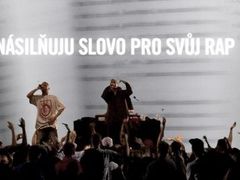Prague - A satellite dish was installed on 13-year-old David Marysko's roof on the outskirts of Prague shortly after Communism fell in 1989. Every day, he rushed home after school and planted himself in front of the Western music from MTV flooding into his television set for the first time"It was unbelievable," Marysko remembers. "Just imagine going from nothing to having so much that you couldn't even take it."
Marysko saw something so different from the Czech covers of American pop songs he grew up hearing: something visceral, honest, and fresh to him. From then on, he decided, he was only going to be a hip hop fan.
In 2009, Czechs like Marysko are still eagerly consuming hip hop music and culture and trying to make their own name in the urban genre of disgruntled youth, while more than three years have passed since American rapper Nas declared with his album title that "Hip Hop Is Dead." Hip hop record sales, show attendance, and enthusiasm have slowed in the United States and Western Europe.
Stickers for hip hop websites litter Prague metro cars and posters promoting shows cover countless lamp posts. Last fall, the American hip hop festival Rock the Bells kicked off its European tour in Prague for the first time. In late November, the first Czech feature film on hip hop, Czech RAPublica, premiered in theaters while Czech producer DJ Wich released "The Golden Touch," the first European album with so many A-list American rappers.
But access to hip hop in the Czech Republic was limited when Marysko first tuned in to MTV. The music exploding out of basements and block parties in America's black urban centers seemed distant and exotic to the teenager growing up in the emotionally reserved and ethnically homogeneous country of Czechs.
Marysko started to regularly visit a store where he rented CDs for 20 crowns each, about $0.60 at the time. Then the self-proclaimed hip-hop "geek" recorded them on old cassette tapes and combed through the liner notes and shout-out section for clues on whose CD he should check out next.
He wrote rhymes and clipped out every brief mention of hip hop music he found in Czech magazines. At night, he sat in his bedroom in a towering, gray apartment complex, listening to Ice T, dreaming about living in Los Angeles, where he imagined he would drive a low rider by the beach and join a gang war.
"I felt like I was on my own," Marysko said of a time when none of his friends listened to hip hop. "I thought there is no one else but me. I felt like a complete ass, from a different universe."
Some thought it would stay that way. "You'd hear rock musicians on TV saying, 'it's not possible to rap in Czech, it wouldn't make sense, you can't bring it from the ghettos of America to the middle of Europe, with our Communist history. It just doesn't suit here,'" Marysko recalls.
Now 30, Marysko goes by the moniker Affro and is the founder of BBaRak magazine, the first and largest hip hop magazine in the Czech Republic.
Marysko has shoulder-length blond hair, and wears a bright purple T-shirt, clean white sneakers, and one leg of his jeans rolled up to his knee. Sitting at a table at Akropolis nightclub in Prague 3, he admits he and his hobby are no longer other-worldly.
"In the beginning, there were 100 people here who were really into hip hop, they knew everything about it and had all the records," Marysko said. "What could you do with such a scene?"
BBaRak's first issue in 2001 was 32 pages, put out by a staff of five hip-hop fans who struggled to find enough gigs to cover. The December 2008 issue was 100 pages and put together by 15 paid employees. They now print 12,000 copies each month.
Czech hip hop fans are famously enthusiastic
Last year 15,000 Czech fans saw 50 Cent perform in Prague for the first time. This summer, in its sixth year, the Czech Republic's Hip Hop Kemp festival was the most highly attended hip hop festival in the world.
Prague's DJ Wich, who's full name is Tomas Pechlak, hopes having guests like Lil' Wayne, Talib Kweli, Raekwon, and Slum Village rap over his beats on "The Golden Touch" will help Czech hip hop gain recognition.
"I am well known here but almost nobody has heard of me overseas. Now I'm starting from the top," said Pechlak, 30, who began producing beats after meeting a friend who was into hip hop in 1998.
Although it took a year-and-a-half to track down a few of his guests, he said he can't believe he is working with rappers he has admired for years. "It's not only the first Czech, but European hip hop record with artists like I have on it," he said. "It's totally new level."
Eric Cherryhill, 27, who goes by Nironic, is a Bronx-born rapper who has lived in Prague for the last five years and has worked with many Czech artists, including Pechlak. The two, along with Czech rapper Indy, scored a number one radio hit with their single, "Live," and were nominated for an Andel award, a Czech equivalent to a Grammy, in 2007.
At a restaurant in the center of Prague, wearing headphones around his neck, well over six-feet-tall Cherryhill nodded his head to his own song that a waitress turned on when he walked in the door.
"When I moved here, there was one hip hop party a week. Now, on any given night, there's four hip hop parties and shows," he said.
Cherryhill explained that in contrast to the U.S., where record labels market hip hop to teenagers - which explains much of its mainstream success in white, suburban America - the Czech scene was "created out of a want to be a part of this culture. It's something a lot of the kids can attach themselves to that is really different."
With the wealth of new music available after the fall of Communism 20 years ago, young people now have the option to listen to whatever music they choose. Many seek still mostly independent hip hop music as a mark of "something they find in their own way," said Cherryhill. "So they feel closer to it."
Czech hip hop fans are famously enthusiastic. Similar to Japan, where one of hip hop's most energetic scenes exists, in Prague normally quiet young people go wild at shows.
The Prague venue Abaton filled to capacity when New York legend DJ Premiere performed in September. A mostly male crowd of C-walking, Rocawear wearing fans held their arms in the air throughout the show and waited at the former warehouse after the show for at least an hour to get autographs. (C-walking is a popular hip hop dance with intricate footwork that originated as a bouncy walk which members of the African American Crips gang in Los Angeles used to ritually spell out letters.)
The crowd - which had little firsthand experience with hip hop outside of the Czech Republic - roared the loudest when Premiere shouted though his microphone, "this is real New York hardcore hip hop."
"It is an escape, of course," said Marysko. "But that's what music should be."
Czech fans have proven to be dedicated disciples, not just casual listeners. In August over one-third of concert goers arrived at the Hip Hop Kemp in the town of Hradec Kralove one day ahead of the festival to secure their places.
In its first year, 2002, Hip Hop Kemp drew 4,000 fans. Last August, 18,000 showed up for the three-day concert headlined by The Roots, with 100 hip hop acts from the Czech Republic, the United States, and other parts of the world: from Australia, to Japan, to Turkey. Two-thirds of the fans were Czech.
Next wave - rapping in Czech
Czechs are not only escaping into the fantasies of American imports. They are working to build their own brand of hip hop that reflects their everyday life.
Petr Ptacek, a 19-year-old from rapper from Broumov, a small town near the Czech-Polish border, has gained a local following after doing shows and releasing self-produced material on the Internet in the last year. He listens to mostly Czech and Slovak rap so he can clearly understand and savor the lyrics and get something out of the music, he said.
"I like songs which give something to my soul, something from which I can take advice from," he said in an email.
When Ptacek raps as MC Peca, he shares his feelings on relationships, family, friends, and aspirations.
"I like the freedom in rap. I can say everything I want to say over a beat and it's a release for me."
Ptacek's approach represents much of the rap coming out of the Czech Republic.
"Here we are not too gangster," Pavel Abraham, the director of Ceska RAPublica - a documentary about the lives of a group of Czech hip hop stars - told Radio Prague on December 5, 2008. "We like to talk about enjoying life, about the simple things in life, like you know, the most important things, like love and so on."
When comparing Czech rap to European hip hop from other countries, Abraham said French or Polish rappers were more socially conscious and "a lot braver."
When Czechs rap, it is "more an occasion to express something funny, or something poetic than some sort of ideas or their own ideology," he said.
Marysko agreed that more politically aware rhymes are missing from the Czech scene, something he'd like to see more of. With an increase of wealth in the Czech Republic - from deep recession in the late 1990s to rapid economic growth now - the subject matter of rap is changing, he said.
"In the beginning, some were rapping about how drugs are bad and drug dealers are jerks and now they're talking about sniffing coke in the VIP section with groupies."
Daniel Kulhanek, 19, a hip hop fan who runs a graffiti website, GraffitiMag.cz said, "some idiots think that hip hop is only about XXXL clothes and New Era hats."
As a Czech fan, he tries to learn about the history of hip hop and understand where it came from. This is as much a part of the culture as merely listening to music, he said.
While Czech rappers struggle to find their collective statement as a community, Cherryhill, a black artist born and raised in hip hop's birthplace, said mainstream Czech music labels and radio stations focus on the superficial and don't give some reputable Czech hip hop a platform.

"I guess they think my music is more authentic," Cherryhill. "I did a song that had a spot on radio rotation before it was even recorded."
As the Czech hip hop community grows beyond an initial tight knit group of devotees, it has also fragmented. "If you read what people say on the Internet, I have so many haters," said Marysko. His eyes narrowed as he recounted malicious threats to him and his family for putting radio-ready rappers like Mike Jones on BBaRak's cover and including gossip of feuds, called "beef" in its reports. "Czechs are always jealous. I am not Jesus but I am putting out my magazine and living what we dreamed together. What's the problem?"
Not even Czech hip hop heroes are not immune to criticism. Cherryhill added that despite overwhelming excitement about DJ Wich's new album, some fans have criticized him for featuring American stars on his beats instead of Czech ones. "But no else is doing what he's doing and getting that much exposure so I completely stand behind him," he said.
A few rappers have hip hop's growing mainstream popularity to thank for unprecedented financial success. Rytmus, a Romany-Slovak rapper is one of the Czech hip hop scene's biggest stars. After performing live and putting out music independently for 15 years, rapping - with many expletives - about his family life and poor childhood, Rytmus's last album sold 20,000 copies. He poses with a new BMW on his MySpace page and at last year's Hip Hop Kemp festival, the Brooklyn group MOP was so impressed with Rytmus' gold chain they asked to borrow it to pose for pictures.
As much as hip hop has arrived in this unlikely hub, it may not attract fans and participants forever. "I don't think hip hop is going to die," said Marysko. "I've had goose bumps hearing kids cheer at shows. But I just know it's not going to be the hottest thing forever."
This story was originally published by the Prague Wanderer, a web-zine run by New York University students in Prague, Czech Republic.
Roxanne Emadi is a third-year student studying Journalism and Middle Eastern studies at New York University. She is from Seattle, Washington. A version of this article was originally written for the International Reporting class at New York University in Prague.

